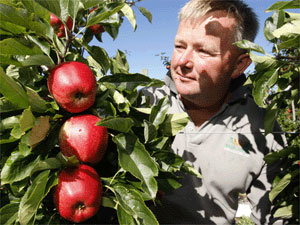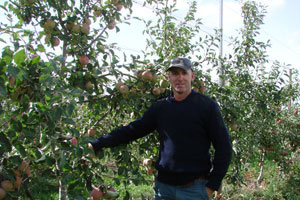Orchard Manager
Tasks & duties

Orchard managers& may do some or all of the following:
-
decide which crops will be grown
-
hire, train, supervise and work alongside orchard workers in growing, maintaining and harvesting crops and doing other maintenance work
-
monitor the growth and health of crops
-
collect information on orchard activities and the progress of crops
-
estimate crop volumes, timing of supply and harvest
-
prepare and manage budgets
-
liaise with people managing, marketing, packing, or selling the crops
-
ensure orchards comply with food safety, health and safety, and other regulations
-
where necessary, ensure orchard work meets the requirements of quarantine and market certification schemes
-
be involved in research projects such as trialling new varieties
Orchard managers need to keep up with developments in fruit technology, varieties and growing methods.
They are increasingly likely to have to use:
-
track and trace systems, which allow buyers to identify which orchard each piece of fruit comes from
-
compliance programs such as GLOBAL GAP (Global Good Agricultural Practice)
-
sustainable practices such as the Apple Futures programme which aims to produce fruit, which has no detectable spray residue
-
systems to reduce energy use and carbon footprints
Some smaller fruit producers are developing specialised products, such as avocado oil, or growing less common varieties for local niche markets, or even to sell directly to buyers overseas.
Specialisations
Orchardists may specialise in growing a particular type of fruit, or organic growing.
They may work for a large orchard business and specialise in an aspect such as:
-
quality control
-
packhouse management
-
inventory management
Skills & knowledge

Orchard managers need to have:
-
knowledge of how to grow and manage specific types of fruit trees/vines to maximise fruit quality and quantity
-
knowledge of soil and plant science
-
knowledge of how to monitor and control weeds, diseases and pests
-
knowledge of how to monitor and protect crops from frost
-
planning skills, to estimate fruit picking times and crop volumes
-
knowledge of how to pick, grade and pack fruit
-
general maintenance and basic mechanical skills
-
knowledge of how to interpret and gauge basic weather information
-
the ability to learn new technology and keep up to date with developments in the industry
-
skill using horticultural fertilisers and chemicals, and knowledge of the rules about their use
They also need management and administration skills, including:
-
the ability to recruit, train and manage staff from different backgrounds and cultural groups
-
communication, organisational, planning and problem-solving skills
-
knowledge of health and safety, food safety quarantine and market compliance systems
-
computer, writing and budgeting skills
Entry requirements
There are no specific entry requirements to become an orchard manager, but employers prefer people with training or experience in horticulture.
Secondary education
At least three years of secondary education is recommended and science subjects, such as horticulture, are useful.
Tertiary Education
A diploma or degree in horticultural science is useful but not essential. Training in business studies or commerce is useful for people who are self-employed.
Organic orcharding qualifications
Diplomas and certificates in organic growing are available from Lincoln University, some polytechnics and Taruna College.
Training on the job
Many skills are gained on the job. Orchard managers may study part time for a national certificate or diploma in horticulture, and may attend conferences, courses and seminars and field days to keep up to date with changes in the industry.
You can do an apprenticeship in basic fruit growing and horticulture skills while working, and get National Certificates in Horticulture (Introductory and Fruit Production) through the NZ Horticulture ITO. These apprenticeships are only available through approved employers.
Polytechs such as Bay of Plenty Polytech and EIT (Eastern Institute of Technology) offer horticultural cadetships for people working on orchards. The part-time study involves a mixture of distance learning and tutorial attendance, block courses and field days, and students gain a National Certificate in Horticulture at Level 2 or 4.
Certificates for spraying specified pesticides and other agrichemicals
-
You need a GROWSAFE certificate, or similar qualification, for spraying agrichemicals.
-
An Approved Handler certificate is necessary for handling some pesticides, and supervising other workers who are spraying.
-
If you are spraying for work on other people's property you need to have a Registered Chemical Applicator certificate.
Useful experience
Useful experience for orchard managers includes seasonal or permanent orchard work or work with trees and plants.
Related courses
Crop Production
Farm Management and Agribusiness
Horticulture
For more information, please refer to Career Services.
Document Actions
